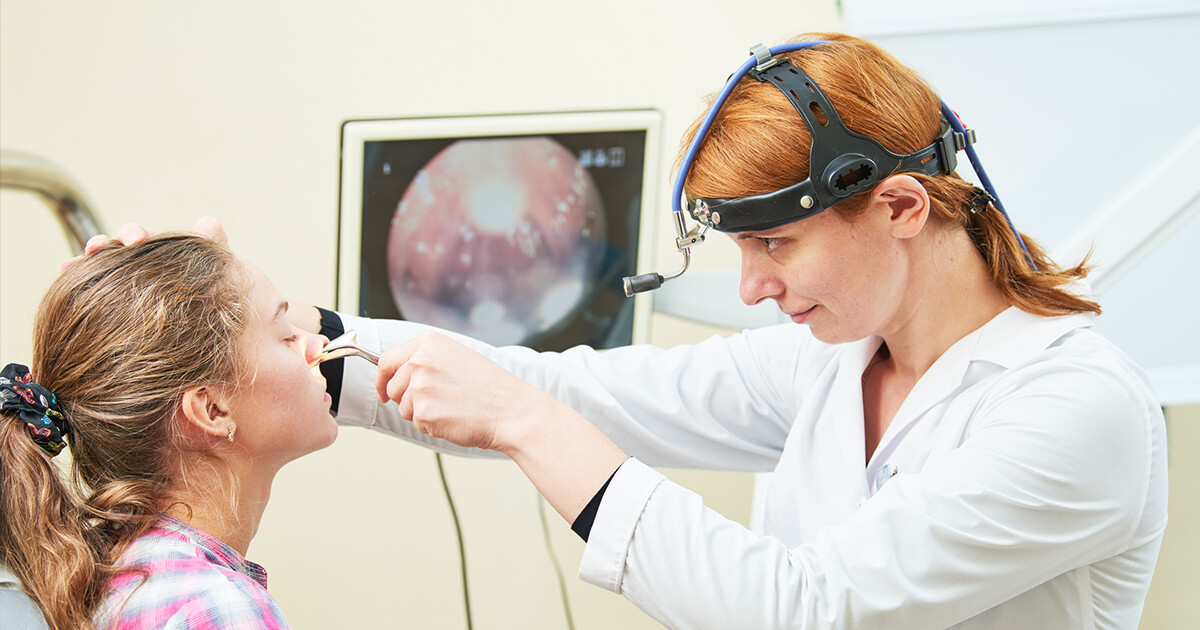Why Scheduling a Visit with an Otolaryngologist Might Improve Your Health
Why Scheduling a Visit with an Otolaryngologist Might Improve Your Health
Blog Article
Discovering the Field of Otolaryngology: What to Anticipate When You Consult an ENT
Otolaryngology, typically referred to as ENT, incorporates the medical diagnosis and therapy of throat, nose, and ear conditions. For those experiencing relevant problems, getting in touch with an ENT professional can offer clearness and alleviation. Comprehending what to anticipate throughout such assessments is necessary for effective communication and treatment. This overview will certainly detail vital facets of the ENT experience, including common reasons for check outs and the procedures involved in diagnosis and treatment.

Recognizing Otolaryngology: An Overview
Otolaryngology, frequently referred to as ENT (Ear, Nose, and Throat) medicine, is a specific branch of medication that concentrates on the diagnosis and therapy of problems influencing these crucial areas of the body. This area includes a variety of conditions, consisting of those pertaining to hearing, balance, respiratory function, and speech. Otolaryngologists are educated to take care of both medical and clinical treatments, making use of advanced methods and modern technologies. Their knowledge prolongs beyond typical ailments, dealing with issues such as allergies, sinus infections, and hearing loss. Furthermore, they play a critical duty in the management of head and neck cancers, supplying comprehensive treatment tailored to individual client needs. In general, otolaryngology continues to be essential for keeping health and wellness and lifestyle in affected individuals.
Typical Reasons to See an ENT Professional
Many people look for the proficiency of an ENT expert for a variety of reasons, showing the diverse nature of problems that affect the throat, nose, and ear. Usual concerns consist of chronic sinusitis, which commonly leads to relentless nasal blockage and face discomfort. Allergies and their associated signs, such as sneezing and itching, additionally prompt check outs to these professionals (ENT Doctor). Hearing loss, whether abrupt or gradual, is an additional substantial factor for consultation. Additionally, individuals might seek examination for throat conditions, including persistent hoarseness or ingesting problems. Rest apnea, identified by disrupted breathing during rest, is often addressed by ENT professionals too. Each of these problems highlights the importance of specialized care in handling complex ENT-related health issues
Planning for Your ENT Appointment
When preparing for an ENT visit, it is essential to collect pertinent info and take into consideration any kind of specific concerns. Clients should put together a thorough clinical history, consisting of previous ear, nose, or throat problems, surgeries, and current drugs. Documenting signs-- such as intensity, frequency, and duration-- can offer beneficial understandings for the ENT expert. Furthermore, people need to prepare a list of concerns they wish to ask, making sure that all worries are resolved throughout the check out. Bringing along any kind of appropriate medical records or test results can even more assist the ENT in understanding the client's problem. Ultimately, patients ought to confirm their consultation details, consisting of time, day, and location, to lessen any type of last-minute confusion. Correct preparation can enhance the efficiency of the assessment and cause much better end results.
What to Anticipate During the Assessment
As the consultation begins, the patient can anticipate to take part in a comprehensive discussion with the ENT specialist about their signs and symptoms and case history. The specialist will inquire regarding the duration, regularity, and severity of symptoms such as hearing loss, nasal congestion, or aching throat. Additionally, the person's previous medical conditions, drugs, and any type of appropriate family members background will be assessed, assisting the professional in developing a full understanding of the individual's health. The ENT might also ask regarding way of living aspects, such as direct exposure to irritants or irritants. This open discussion develops a foundation for the assessment, guaranteeing that the patient's problems are resolved and setting the stage for any type of essential evaluations or recommendations for therapy.
Diagnostic Tests and Procedures in Otolaryngology
A series of analysis examinations and procedures are crucial in otolaryngology to properly review and identify conditions impacting the throat, nose, and ear. Typical tests consist of audiometry, which measures hearing feature, and tympanometry, assessing center ear pressure. Nasal endoscopy allows visualization of the nasal flows and sinuses, while laryngoscopy takes a look at the throat and vocal cables. Imaging techniques, such as CT scans and MRIs, provide detailed sights of head and neck structures. Allergic reaction testing may additionally be conducted to recognize triggers for sinus or breathing concerns. These diagnostic devices enable ENT professionals to establish a comprehensive understanding of patients' problems, ensuring customized and efficient management strategies. Appropriate diagnosis is important for effective therapy end results in otolaryngology.
Therapy Options Used by ENT Specialists
ENT professionals offer a range of treatment alternatives tailored to resolve particular problems influencing the ear, nose, and throat. These treatments vary from conventional methods, such as medicine and way of living adjustments, to even more intrusive procedures. Allergies might be handled with antihistamines or immunotherapy, while persistent sinusitis might require nasal corticosteroids or sinus surgical treatment. For hearing loss, ENT specialists commonly advise listening devices or medical treatments like cochlear implants. In instances of throat conditions, options can include speech therapy or surgical procedures to eliminate blockages. Furthermore, they may supply advice for managing sleep apnea, including making use of CPAP gadgets or surgical interventions. Generally, the objective is to improve people' lifestyle via customized care and reliable therapy techniques.
When to Look For Follow-Up Treatment With an ENT
Acknowledging when to look for follow-up care with an ENT professional is vital for managing continuous symptoms or complications associated with nose, ear, and throat problems. Individuals should consider setting up a follow-up visit if signs and symptoms persist in spite of initial treatment, such as chronic ear discomfort, nasal blockage, or throat pain. Adjustments in hearing, equilibrium issues, or unusual nasal discharge might additionally call for further evaluation. Additionally, if a patient experiences negative effects from recommended medicines or has undergone a surgery, follow-up care is essential to keep track of recovery and address any kind of concerns. Prompt appointments can ensure effective management of conditions, protect against potential issues, and give assurance pertaining to one's health. Seeking follow-up treatment promotes positive health monitoring in otolaryngology.
Often Asked Concerns

What Certifications Should I Search for in an ENT Expert?
When looking for an ENT expert, one should look for board certification, appropriate experience, and strong individual testimonials. In addition, efficient interaction abilities and a caring approach can substantially improve the total therapy experience.
Exactly how Do I Select the Right ENT for My Needs?
Choosing the right ENT professional entails examining their certifications, experience, and individual reviews (ENT surgery). It is necessary to ponder their communication style and approach to therapy, guaranteeing they straighten with the person's particular health requirements and preferences
Exist Any Type Of Dangers Connected With ENT Procedures?
The risks related to ENT treatments may include infection, bleeding, anesthesia complications, and potential damages to surrounding structures. People should more info go over these threats with their physician to comprehend specific issues and warranty educated choices.
Just How Can I Handle Anxiety Before My ENT Visit?
To manage anxiety before an appointment, individuals can exercise deep breathing exercises, envision positive outcomes, prepare concerns ahead of time, and look for assistance from pals or family, cultivating a sense of confidence and peace.
What Should I Do if I Experience Negative Effects From Treatment?
The individual should quickly report them to their healthcare copyright if side effects from therapy take place. Adjustments to therapy or additional treatments may be necessary to guarantee safety and performance in handling their condition - Otolaryngologist. As the consultation starts, the individual can anticipate to involve in an extensive conversation with the ENT specialist concerning their signs and clinical history. These analysis devices make it possible for ENT professionals to develop an extensive understanding of patients' problems, ensuring tailored and efficient administration plans. ENT experts provide a variety of treatment options tailored to resolve specific conditions impacting the nose, throat, and ear. When looking for an ENT expert, one should look for board certification, appropriate experience, and solid client testimonials. Choosing the right ENT professional entails examining their credentials, experience, and person testimonials
Report this page